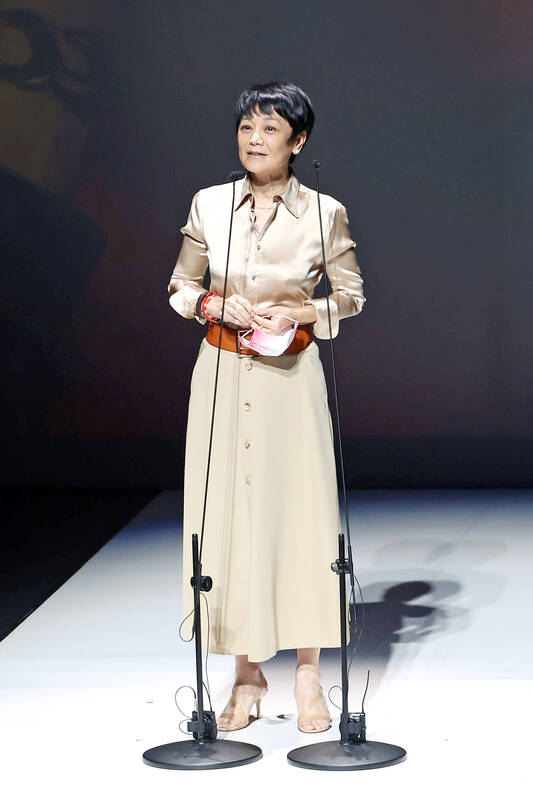A retrospective featuring dozens of lesser-known movies made in the 1980s during a period that was later characterized as the Taiwan New Cinema movement, launched in New Taipei City on Friday evening.
Thirty-one movies and short films made in Taiwan from 1982 to 1987 were selected for the retrospective “Taiwan New Cinema: Revisited” and are to be screened at the Taiwan Film and Audiovisual Institute (TFAI) until Nov. 27.
The selection includes 1983’s Kendo Kids (竹劍少年) by director Chang Yi (張毅). The coming-of-age film tells the story of a group of high-school students who learn the harsh reality of the adult world in the port city of Keelung.

Photo: CNA
Director Chen Kun-hou’s (陳坤厚) My Favorite Season (最想念的季節) is also showing. The 1985 romcom depicts an independent woman who battles to find her footing in Taipei after realizing that she is pregnant by a married man.
At the opening of the film festival, Chen said the movie touches upon an issue that was seen as shocking at that time.
“But we tried to provide an alternative way of looking at it ... to explore different possibilities of handling this kind of issue,” he said.
The movie’s lead actress, Sylvia Chang (張艾嘉), who is now 69, said that of the approximately 100 movies she had been involved in over her 50 years of working in the industry, the romcom was one of her favorites.
The actress and filmmaker, who won the film category of the National Award for Arts on Friday, said filmmakers in the 1980s were not preoccupied with the idea of making something new or innovative.
“At that time, we were just hoping to tell the stories of our generation,” Chang said.
The Taiwan New Cinema movement was a breakthrough, because Taiwanese movies made during that period gained international recognition for the first time, institute president Lan Tsu-wei (藍祖蔚) said.
The movies were reflective of Taiwan’s sociopolitical situation in the 1980s and filmmakers at that time used their lens “to look at what was actually happening on our island,” Lan said, adding that the cinematic movement marked a clear departure from the period preceding it, in which martial arts, melodrama and political propaganda took center stage.
By hosting the retrospective, the institute is hoping to promote lesser-known Taiwan New Cinema films at home and abroad during 40th anniversary of the the movement’s inception, Lan said.
The institute looks forward to finding collaborators to take the retrospective on tour in other countries, he added.
Despite its focus on lesser-known films, the retrospective also features two internationally acclaimed movies: Edward Yang’s (楊德昌) A Brighter Summer Day (牯嶺街少年殺人事件), which won Best Feature Film at the 1991 Golden Horse Awards, and Dust in the Wind (戀戀風塵) by Hou Hsiao-hsien (侯孝賢).

Nipah virus infection is to be officially listed as a category 5 notifiable infectious disease in Taiwan in March, while clinical treatment guidelines are being formulated, the Centers for Disease Control (CDC) said yesterday. With Nipah infections being reported in other countries and considering its relatively high fatality rate, the centers on Jan. 16 announced that it would be listed as a notifiable infectious disease to bolster the nation’s systematic early warning system and increase public awareness, the CDC said. Bangladesh reported four fatal cases last year in separate districts, with three linked to raw date palm sap consumption, CDC Epidemic Intelligence

The manufacture of the remaining 28 M1A2T Abrams tanks Taiwan purchased from the US has recently been completed, and they are expected to be delivered within the next one to two months, a source said yesterday. The Ministry of National Defense is arranging cargo ships to transport the tanks to Taiwan as soon as possible, said the source, who is familiar with the matter. The estimated arrival time ranges from late this month to early next month, the source said. The 28 Abrams tanks make up the third and final batch of a total of 108 tanks, valued at about NT$40.5 billion

Two Taiwanese prosecutors were questioned by Chinese security personnel at their hotel during a trip to China’s Henan Province this month, the Mainland Affairs Council (MAC) said yesterday. The officers had personal information on the prosecutors, including “when they were assigned to their posts, their work locations and job titles,” MAC Deputy Minister and spokesman Liang Wen-chieh (梁文傑) said. On top of asking about their agencies and positions, the officers also questioned the prosecutors about the Cross-Strait Joint Crime-Fighting and Judicial Mutual Assistance Agreement, a pact that serves as the framework for Taiwan-China cooperation on combating crime and providing judicial assistance, Liang

A group from the Taiwanese Designers in Australia association yesterday represented Taiwan at the Midsumma Pride March in Melbourne. The march, held in the St. Kilda suburb, is the city’s largest LGBTQIA+ parade and the flagship event of the annual Midsumma Festival. It attracted more than 45,000 spectators who supported the 400 groups and 10,000 marchers that participated this year, the association said. Taiwanese Designers said they organized a team to march for Taiwan this year, joining politicians, government agencies, professionals and community organizations in showing support for LGBTQIA+ people and diverse communities. As the first country in Asia to legalize same-sex